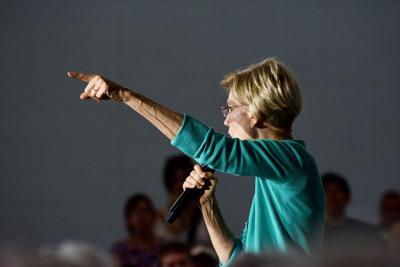Democratic presidential candidate U.S. Sen. Elizabeth Warren wants more attention paid to solving the nation's nuclear-waste storage conundrum and thinks more money should be spent on nuclear remediation efforts in general.
The Massachusetts senator during a Saturday interview with the Aiken Standard said the nation needs a "coherent plan" for the "long-term storage of nuclear waste material."
"We need to be willing to put the resources into it, to work with local government and the people whose lives will be touched by this," Warren said before her town hall event at USC Aiken, which is about 20 miles north of the Savannah River Site, a three-county federal installation home to millions of gallons of nuclear waste and metric tons of plutonium.
"Resources are necessary. Safety isn't free," Warren later said, speaking broadly about nuclear cleanup. "It means a real investment from all of us to make certain that we've done what's right. And that's true whether we're talking nuclear storage, health care or universal access to childcare. These are all things that cost money."
Yucca Mountain is not the answer, though, according to the senator, who is known for her more liberal policies and positions. Asked if her solution would be a single waste-storage site or multiple, Warren demurred: "That's the point when I said we need a coherent plan, and it starts with good science, not with bad politics."
Warren during the interview described the Yucca Mountain locale, a desolate portion of southwestern Nevada, as "seismically unstable," mirroring concerns raised by the state's local and federal leaders.
"We will not allow the (Donald) Trump administration to make our state the dumping ground for the nation's nuclear waste," U.S. Rep. Dina Titus, a Nevada Democrat, said in a mid-June statement.
"I am totally opposed to any legislative effort to restart the Yucca Mountain project," Nevada Gov. Steve Sisolak said in April. "My position, and that of the state of Nevada, remains identical to the position of Nevada’s past five governors: The state of Nevada opposes the project based on scientific, technical, and legal merits."
Sisolak and U.S. Sen. Catherine Cortez Masto have also voiced concerns about Yucca Mountain's proximity to Nellis Air Force Base, which they have said aggravates an already sore subject and boosts risks at the multibillion-dollar would-be repository.
U.S. Secretary of Energy Rick Perry pushed back on that point during a Senate Energy and Natural Resources Committee budget hearing earlier this year.
"I think it's safe, senator," Perry said at the time, responding to Cortez Masto, D-Nev.
Yucca Mountain, about 90 miles from Las Vegas, was in the 1980s identified as the nation's potential nuclear storehouse – it would take, and hold, some of the most serious wastes on the planet. The project was given another green light in 2002. But prospects soured under President Barack Obama; the U.S. Government Accountability Office, a congressional-spending watchdog, has said it was terminated amid political posturing and social pressures.
Mark Sanford, the former South Carolina governor and congressman who is now mulling a presidential candidacy, has described it as "political football of sorts."
U.S. Sen. Lindsey Graham, R-S.C., in May blamed Harry Reid, a former top Democrat representing Nevada who mounted an opposition campaign.
Warren arrives outside, hops up on a table and greets the overflow crowd.
— Colin Demarest (@demarest_colin) August 17, 2019
The senator says she’s ready to turn South Carolina and Georgia blue. pic.twitter.com/bRZcAoa1vf
President Donald Trump's fiscal year 2020 budget request – far from final appropriations – included $116 million to revive Yucca Mountain and bolster a related interim storage program. His FY19 blueprint included $120 million for the same.
"Show me your budget, and I'll tell you your values," Warren said Saturday. "That's what my campaign is all about."
Warren is not alone in her distaste for Yucca Mountain. Fellow presidential contender U.S. Sen. Bernie Sanders, who is running as a Democrat, denounced the mothballed repository in a video posted months ago.
In a separate statement, Sanders described sending nuclear waste to Yucca Mountain as a "geological, environmental, and social disaster."
U.S. Sen. Kamala Harris, a California Democrat, is opposed to Yucca Mountain also, per her presidential campaign.
There are more than two-dozen states where nuclear waste is currently held. South Carolina is one of them.
U.S. Rep. Jeff Duncan, a Republican representing South Carolina's 3rd Congressional District, is an outspoken proponent of Yucca Mountain. He believes it's a shoo-in solution for the Savannah River Site and nuclear power plants.
Warren, a member of the Senate Armed Services Committee, did not mention the Savannah River Site during her rally in Aiken over the weekend. Her speech focused on what she deemed "big, structural change."




